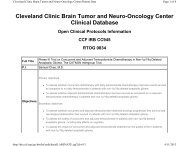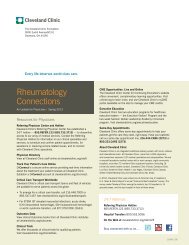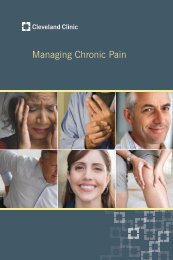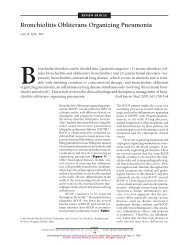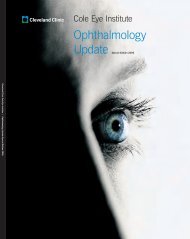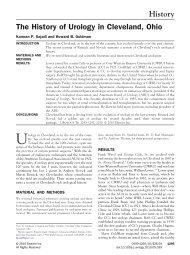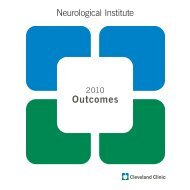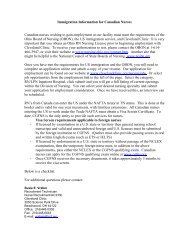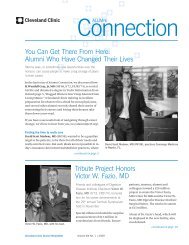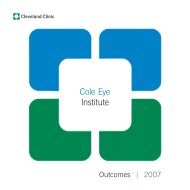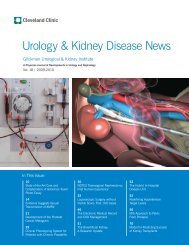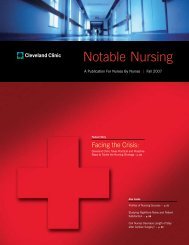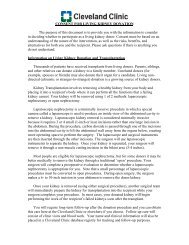stroke care cerebrovascular center - Cleveland Clinic
stroke care cerebrovascular center - Cleveland Clinic
stroke care cerebrovascular center - Cleveland Clinic
You also want an ePaper? Increase the reach of your titles
YUMPU automatically turns print PDFs into web optimized ePapers that Google loves.
a ResoURce foR PaTienTs<br />
cleveland clinic’s <strong>cerebrovascular</strong> <strong>center</strong>, nationally recognized<br />
for its <strong>stroke</strong> <strong>care</strong>, has nine Primary Stroke Centers certified by<br />
The Joint Commission, an independent, non-profit organization<br />
that evaluates and accredits nearly 15,000 health-<strong>care</strong><br />
organizations and programs. this means these facilities have<br />
met stringent national <strong>stroke</strong> <strong>care</strong> standards. our primary <strong>stroke</strong><br />
<strong>center</strong>s are at cleveland clinic main campus, euclid, Fairview,<br />
Hillcrest, lakewood, marymount, medina and south pointe<br />
hospitals and at the ashtabula county medical <strong>center</strong>. in<br />
addition, patients at cleveland clinic may have access to<br />
investigational therapies and new surgical procedures that<br />
are not widely available.<br />
UsinG This GUide<br />
Please refer to this guide as you examine your<br />
treatment options. Remember, it is your right<br />
as a patient to ask questions and seek a<br />
second opinion.<br />
Treatment Guide<br />
<strong>stroke</strong> <strong>care</strong><br />
<strong>cerebrovascular</strong> <strong>center</strong><br />
if your primary <strong>care</strong> physician is not on staff<br />
at cleveland clinic, he or she can keep in<br />
constant contact with our team via a dedicated<br />
consultation line and through our drconnect<br />
secure online network.<br />
no matter which cleveland clinic facility you<br />
choose, you are assured of standardized <strong>stroke</strong><br />
<strong>care</strong> across our health system. patients receive<br />
comprehensive treatment by an interdisciplinary<br />
team of <strong>stroke</strong> specialists including neurologists,<br />
neurosurgeons and interventional neuroradiologists,<br />
as well as rehabilitation, emergency medicine and<br />
nursing specialists with expertise in <strong>stroke</strong> <strong>care</strong>.<br />
in addition, patients at cleveland clinic’s<br />
<strong>cerebrovascular</strong> <strong>center</strong> have access to investigational<br />
therapies and new surgical procedures that<br />
are not widely available. our staff provides the<br />
highest-quality <strong>stroke</strong> <strong>care</strong> available anywhere.<br />
same-day appointments available | <strong>cerebrovascular</strong> <strong>center</strong>: 866.588.2264 | clevelandclinic.org/<strong>stroke</strong>
“This was such a scary<br />
thing to go through. I really<br />
needed answers and hope.<br />
Since my treatment, I have<br />
talked with a few people<br />
who know someone who<br />
is suffering from similar<br />
mini-<strong>stroke</strong>-like episodes,<br />
and I always refer them<br />
to <strong>Cleveland</strong> <strong>Clinic</strong>. I even<br />
carry the phone number<br />
to <strong>Cleveland</strong> <strong>Clinic</strong> in my<br />
cell phone to have ready<br />
to hand out! Without<br />
<strong>Cleveland</strong> <strong>Clinic</strong>, I really<br />
could have suffered<br />
irreversible brain damage.”<br />
– Teresa Martens, 23,<br />
of Higginville, Missouri<br />
2<br />
cleveland clinic | <strong>stroke</strong> | treatment guide<br />
WhaT is a sTRoKe?<br />
each year, more than half a million americans suffer from <strong>stroke</strong>s; <strong>stroke</strong> is<br />
the third leading cause of death in the united states and a leading cause of<br />
serious long-term disability, according to the american Heart association<br />
and american <strong>stroke</strong> association.<br />
a <strong>stroke</strong>, or “brain attack,” occurs when the blood supply is cut off from<br />
part of the brain. When this happens, the blood-deprived brain loses its<br />
supply of oxygen and nutrients. When the brain is deprived of blood for<br />
even a few minutes, it begins to die.<br />
There are two types of <strong>stroke</strong> — ischemic and hemorrhagic.<br />
in ischemic <strong>stroke</strong>s, brain arteries become blocked and prevent blood from<br />
nourishing the brain. in hemorrhagic <strong>stroke</strong>s, brain arteries rupture from<br />
damage caused by high blood pressure and other risk factors or an aneurysm<br />
(an abnormal out-pouching of a blood vessel). This causes blood to flood<br />
the brain, creating pressure that leads to brain-cell death.<br />
<strong>stroke</strong>s do occur in young patients, and pediatric <strong>stroke</strong> requires highly<br />
specialized <strong>care</strong>. We maintain a dedicated pediatric <strong>stroke</strong> program for the<br />
evaluation and management of childhood <strong>stroke</strong> from birth to age 18. We<br />
are also part of the international pediatric <strong>stroke</strong> study group, actively<br />
participating in pediatric <strong>stroke</strong> clinical trials and data collection. our<br />
pediatric neurology team works closely with pediatricians and pediatric<br />
specialists at cleveland clinic children’s Hospital, offering advanced<br />
medical <strong>care</strong> and rehabilitation services.<br />
remember that for every minute brain cells are deprived of oxygen during<br />
a <strong>stroke</strong>, brain damage increases. the chances for survival and recovery<br />
improve when treatment begins within the first few hours of <strong>stroke</strong><br />
warning signs.<br />
immediate treatment of a <strong>stroke</strong> may limit or prevent brain damage. a<br />
thrombolytic agent or “clot buster” medication may be given within the first<br />
three hours of the onset of <strong>stroke</strong> symptoms. Hence, it is critical to get to<br />
the hospital quickly if you experience <strong>stroke</strong> symptoms. the fastest way is<br />
to call 9-1-1.<br />
same-day appointments available | call 866.588.2264 For tHe <strong>cerebrovascular</strong> <strong>center</strong>
WhaT aRe RisK facToRs foR a sTRoKe?<br />
clevelandclinic.org/<strong>stroke</strong><br />
<strong>stroke</strong> | treatment guide | cleveland clinic<br />
if your primary <strong>care</strong> physician has diagnosed you as being<br />
at risk for a <strong>stroke</strong>, a cleveland clinic <strong>stroke</strong> neurologist<br />
can help determine your best course of treatment.<br />
many factors increase the risk for <strong>stroke</strong>. some factors<br />
can be controlled; others cannot.<br />
• Family history: those who have a family history<br />
of <strong>stroke</strong>s or a prior <strong>stroke</strong> are at higher risk for<br />
having a <strong>stroke</strong>.<br />
• High blood pressure: <strong>stroke</strong>s are four to six<br />
times more likely to occur in people with high<br />
blood pressure.<br />
• High cholesterol: people with high cholesterol are<br />
at double the risk of having a <strong>stroke</strong>.<br />
• Heart disease: <strong>stroke</strong>s are six times more likely<br />
to occur in people with heart disease.<br />
• Excess weight: being overweight can lead to heart<br />
disease and high cholesterol, which, in turn,<br />
increase chances of having a <strong>stroke</strong>.<br />
• Alcohol use: Heavy drinking increases the<br />
risk for <strong>stroke</strong>.<br />
• Tobacco use: smokers have double the risk for<br />
<strong>stroke</strong> as nonsmokers.<br />
• Gender: men are more likely to have <strong>stroke</strong>s<br />
than women.<br />
• Race: african-americans have a higher rate of<br />
<strong>stroke</strong> than other races.<br />
• Age: after age 55, there is an increased<br />
likelihood of <strong>stroke</strong>.<br />
• Chronic disease: diabetics are at higher risk<br />
for <strong>stroke</strong>.<br />
How can I reduce my risk?<br />
• control your blood pressure.<br />
• Find out if you have heart disease, especially an<br />
irregular heartbeat known as atrial fibrillation (AF).<br />
• don’t smoke.<br />
• Find out if you have a diseased carotid artery<br />
(arteries that provide blood flow to the head).<br />
• lower your cholesterol.<br />
• limit your alcohol intake.<br />
• control your weight.<br />
• if you have diabetes, manage the disease.<br />
WhaT aRe The WaRninG siGns?<br />
many warning signs indicate you may be suffering<br />
a <strong>stroke</strong>. depending on the function of the part of<br />
the brain affected, the person suffering the <strong>stroke</strong><br />
suddenly may become paralyzed, blind or unable<br />
to speak.<br />
It is crucial to get to a hospital immediately. If you<br />
experience any of these major <strong>stroke</strong> warning<br />
signs, call 9-1-1:<br />
• sudden loss of speech<br />
• slurred speech<br />
• sudden loss of vision<br />
• blurry or double vision<br />
• sudden paralysis<br />
• sudden weakness<br />
• sudden dizziness<br />
• sudden, severe headache, often accompanied<br />
by neck stiffness and vomiting<br />
For patients with risk factors, medications for blood<br />
pressure, diabetes and high cholesterol are important<br />
preventive measures. smoking must stop. a person<br />
who has had transient ischemic attacks (also known<br />
as tias or mini<strong>stroke</strong>s) or a <strong>stroke</strong> may be treated<br />
with aspirin or other antiplatelet or anticoagulant medications<br />
to reduce the risk of another attack. a type of<br />
surgery called carotid endarterectomy is sometimes<br />
recommended to reduce the risk of a major <strong>stroke</strong>. in<br />
this procedure, the fatty deposits in the carotid artery<br />
that block blood flow to the brain are removed. Nonsurgical<br />
options for opening blocked carotid arteries<br />
include angioplasty and stenting.<br />
3
toni greaves<br />
cRiTical caRe TRansPoRT<br />
if you or someone in your family is<br />
having a <strong>stroke</strong>, expedited transport<br />
is crucial. cleveland clinic’s critical<br />
<strong>care</strong> transport team is available 24<br />
hours a day to transport patients to<br />
our facility from anywhere in the<br />
world. Our fleet consists of mobile<br />
icu vehicles, helicopters and<br />
fixed-wing aircraft.<br />
specialty <strong>care</strong> teams of physicians,<br />
nurse practitioners, critical <strong>care</strong><br />
nurses, paramedics and allied health<br />
professionals provide customized<br />
<strong>care</strong>, including pediatric <strong>care</strong> for<br />
infants, children, teens and young<br />
adults. in transit, these teams can<br />
communicate with your primary <strong>care</strong><br />
physician or any doctor who has<br />
been treating you.<br />
4<br />
cleveland clinic | <strong>stroke</strong> | treatment guide<br />
WhaT TReaTmenT oPTions aRe available?<br />
Our highly trained, diverse team of board-certified specialists and<br />
sub-specialists collaborates to provide comprehensive <strong>care</strong> for <strong>stroke</strong><br />
patients. that team includes:<br />
• vascular neurologists<br />
• <strong>cerebrovascular</strong> and endovascular neurosurgeons<br />
• interventional neuroradiologists with training in neurosurgery,<br />
radiology and neurology<br />
• neurointensivists (physicians specially trained in<br />
neurocritical <strong>care</strong>)<br />
• pediatric <strong>stroke</strong> neurologists<br />
• neuroanesthesiologists<br />
• <strong>stroke</strong> rehabilitation specialists<br />
As indicated by our national awards and certifications, <strong>Cleveland</strong> <strong>Clinic</strong>’s<br />
<strong>cerebrovascular</strong> <strong>center</strong> has a rigorous <strong>stroke</strong> <strong>care</strong> protocol that meets<br />
or exceeds national standards and guidelines that improve outcomes.<br />
diagnostic tools such as brain image scans help guide treatment, and<br />
neurologists conduct fast but thorough patient evaluations. Further,<br />
cleveland clinic has been recognized for its fast “door-to-needle” time –<br />
the time from arrival at the hospital to administration of intravenous<br />
therapies. this timing is recognized as crucial in <strong>stroke</strong> treatment.<br />
cleveland clinic’s neurological intensive <strong>care</strong> unit (icu) is staffed 24/7<br />
by a team of critical <strong>care</strong> neurologists.<br />
For pediatric <strong>stroke</strong> patients, we offer a dedicated pediatric icu staffed<br />
full time by experienced pediatric intensivists and pediatric neurologists.<br />
at our neurovascular ultrasound laboratory, we perform advanced<br />
diagnostic examinations to detect abnormalities in the circulation of<br />
blood through the brain. this aids in assessing why a patient has<br />
suffered a <strong>stroke</strong> or transient ischemic attack (tia) and helps<br />
determine the best therapies.<br />
same-day appointments available | call 866.588.2264 For tHe <strong>cerebrovascular</strong> <strong>center</strong>
WhaT can i exPecT fRom RehabiliTaTion?<br />
clevelandclinic.org/<strong>stroke</strong><br />
<strong>stroke</strong> | treatment guide | cleveland clinic<br />
in collaboration with the neurological institute’s<br />
department of physical medicine and rehabilitation,<br />
we offer a full spectrum of rehabilitation services<br />
designed to return <strong>stroke</strong> patients to the best possible<br />
quality of life.<br />
our continuum of <strong>care</strong> spans all phases of the<br />
rehabilitative process, from hospital to home. our<br />
multidisciplinary team of rehabilitation specialists<br />
includes physiatrists, neurologists, rehabilitation nurses,<br />
physical and occupational therapists, speech and<br />
language pathologists, psychologists, social workers,<br />
recreational therapists and case managers.<br />
these professionals help patients with cognition,<br />
mobility, communication, self-<strong>care</strong> and more. rehabilitation<br />
begins at the inpatient stage and continues on<br />
an outpatient basis, including support from cleveland<br />
clinic Home <strong>care</strong> services, if needed. comprehensive<br />
rehabilitation services for pediatric patients are offered<br />
through our children’s Hospital for rehabilitation.<br />
WhaT ReseaRch is beinG done To imPRove<br />
sTRoKe caRe?<br />
lerner research institute, the basic science research<br />
arm of cleveland clinic, houses 36 scientists working<br />
on neurologically based research projects. ongoing<br />
<strong>cerebrovascular</strong> research includes several <strong>stroke</strong>-related<br />
studies such as:<br />
• subcortical stimulation for rehabilitation of motor<br />
deficits following <strong>stroke</strong><br />
• delivery of antioxidant enzymes in cerebral <strong>stroke</strong><br />
• cognitive training that may enhance motor function<br />
in <strong>stroke</strong> patients<br />
• functional and anatomical adaptations of the brain<br />
after <strong>stroke</strong> and as a result of medical rehabilitation<br />
Access to <strong>Clinic</strong>al Trials<br />
the <strong>cerebrovascular</strong> <strong>center</strong> has led several major<br />
international trials of <strong>stroke</strong> medications, including<br />
the first-ever trial of intra-arterial thrombolysis in<br />
acute <strong>stroke</strong>. our patients have the opportunity to<br />
participate in other leading-edge clinical research<br />
trials, such as:<br />
• an investigation of insulin resistance<br />
intervention after <strong>stroke</strong><br />
• a study of stenting and aggressive medical<br />
management for preventing recurrent <strong>stroke</strong><br />
• an evaluation of mechanical retrieval and<br />
recanalization of <strong>stroke</strong> clots using a surgical<br />
technique called embolectomy<br />
• a trial of stenting devices for symptomatic<br />
ischemic <strong>stroke</strong><br />
patients also may qualify to participate in<br />
studies investigating possible genetic links to<br />
the development of brain aneurysms.<br />
to learn more about our clinical trials, call<br />
amy richmond at 216.444.9524.<br />
5
ameRica’s besT hosPiTals<br />
U.S. News & World Report’s<br />
“america’s best Hospitals” survey<br />
has consistently ranked both our<br />
pediatric and adult neurology and<br />
neurosurgery programs among<br />
the top 10 in the nation and<br />
best in ohio.<br />
6<br />
cleveland clinic | <strong>stroke</strong> | treatment guide<br />
Why choose cleveland clinic?<br />
<strong>Cleveland</strong> <strong>Clinic</strong> is a nonprofit multispecialty academic medical <strong>center</strong>,<br />
consistently ranked among the top hospitals in america by U.S. News &<br />
World Report. Founded in 1921, it is dedicated to providing quality<br />
specialized <strong>care</strong> and includes an outpatient clinic, a hospital with more<br />
than 1,300 staffed beds, an education institute and a research institute.<br />
one of 26 institutes at cleveland clinic, the multidisciplinary neurological<br />
institute is committed to improving outcomes while treating patients with<br />
compassion and respect. by bringing together physicians from different<br />
training backgrounds and experiences, the institute’s <strong>cerebrovascular</strong><br />
<strong>center</strong> offers a collaborative, multidisciplinary environment to meet the<br />
needs of patients suffering from <strong>cerebrovascular</strong> disorders. this unique<br />
disease-<strong>center</strong>ed approach allows individualized <strong>care</strong> for each patient,<br />
bringing together a variety of expert perspectives, including:<br />
• Board-certified vascular and interventional neurologists<br />
• Board-certified <strong>cerebrovascular</strong> and endovascular neurosurgeons<br />
• Board-certified Interventional neuroradiologists<br />
• Board-certified neurointensivists<br />
• <strong>stroke</strong> prevention and rehabilitation specialists<br />
• pediatric <strong>stroke</strong> neurologists<br />
<strong>cerebrovascular</strong> <strong>center</strong> patients are seen at our main campus in cleveland<br />
and at locations throughout northeast ohio.<br />
in addition to <strong>stroke</strong>s, the <strong>cerebrovascular</strong> <strong>center</strong> provides treatment for<br />
brain aneurysms, brain and spinal vascular malformations, carotid<br />
stenosis, intracranial atherosclerosis and other <strong>cerebrovascular</strong> conditions.<br />
if you or someone you know has a <strong>cerebrovascular</strong> disorder, please do not<br />
hesitate to contact us.<br />
need a second oPinion bUT cannoT TRavel To cleveland?<br />
our myconsult service offers secure online second opinions for patients<br />
who cannot travel to cleveland. through this service, patients enter<br />
detailed health information and mail pertinent test results to us. then,<br />
cleveland clinic experts render an opinion that includes treatment options<br />
or alternative recommendations regarding future therapeutic considerations.<br />
to learn more about myconsult, please visit clevelandclinic.org/myconsult.<br />
same-day appointments available | call 866.588.2264 For tHe <strong>cerebrovascular</strong> <strong>center</strong>
QUesTions To asK When consideRinG<br />
a PRovideR foR sTRoKe caRe<br />
Q: is the neurologist/neurosurgeon<br />
fellowship trained?<br />
clevelandclinic.org/<strong>stroke</strong><br />
<strong>stroke</strong> | treatment guide | cleveland clinic<br />
a. our <strong>stroke</strong> neurologists and <strong>cerebrovascular</strong> and<br />
endovascular neurosurgeons are fellowship trained.<br />
their areas of expertise combine research, education<br />
and clinical practice to provide innovative and<br />
scientifically based treatments for <strong>cerebrovascular</strong><br />
disease with the highest quality patient <strong>care</strong>.<br />
Q: do you work within a multidisciplinary team?<br />
a. the <strong>cerebrovascular</strong> <strong>center</strong> at cleveland clinic<br />
understands the importance of tailoring therapy for each<br />
patient. by bringing together physicians from different<br />
training backgrounds and experiences, we offer a<br />
collaborative, multidisciplinary environment to meet the<br />
needs of patients suffering from <strong>cerebrovascular</strong> disorders.<br />
this unique disease-<strong>center</strong>ed approach allows us to<br />
approach each patient with a consensus plan, benefiting<br />
from a variety of expert perspectives including:<br />
• Board-certified vascular neurologists<br />
• Board-certified <strong>cerebrovascular</strong> and<br />
endovascular neurosurgeons<br />
• interventional neuroradiologists with training in<br />
neurosurgery, radiology and neurology<br />
• neurointensivists<br />
• neuro-anesthesiologists<br />
• <strong>stroke</strong> prevention and rehabilitation specialists<br />
Q: how many <strong>cerebrovascular</strong> cases does the<br />
surgeon treat each year?<br />
a. our <strong>cerebrovascular</strong> <strong>center</strong> team completed more<br />
than 1,000 surgical/interventional procedures last year<br />
with 1,499 admissions and 4,219 outpatient visits.<br />
Q: Will i be <strong>care</strong>d for in a dedicated nicU<br />
(neurological intensive <strong>care</strong> Unit) with<br />
neurointensivists present in the unit 24/7?<br />
a. Within our 22-bed, state-of-the-art dedicated<br />
neurointensive <strong>care</strong> unit (nicu), we treat more than<br />
1,300 patients per year, with 24/7 coverage. this full<br />
service nicu is equipped to treat any patient with<br />
neurological injury, regardless of the severity. the nicu<br />
also is equipped to handle any heart, lung and gastrointestinal<br />
problems that may arise in neurological<br />
patients. in addition, we have specialized equipment<br />
specifically for the treatment of patients with neurological<br />
illnesses, including inside-the-brain oxygen sensors<br />
and blood flow monitors, and portable head Computed<br />
tomography (ct) scanning.<br />
Q: What is the average length of stay?<br />
a. the length of your stay in the hospital is one indication<br />
of how good the entire <strong>care</strong> team, from physicians to<br />
nurses and others, are in expediting your recovery and<br />
return to home. at the cleveland clinic <strong>cerebrovascular</strong><br />
<strong>center</strong>, we have achieved and maintained average<br />
lengths of stay for our patients consistently below<br />
national benchmarks for four years in a row. the<br />
expected length of stay in the hospital will vary based<br />
on your particular condition and treatment, but at the<br />
<strong>cerebrovascular</strong> <strong>center</strong> many treatments can now be<br />
done without a single night spent in the hospital.<br />
Q: What are your mortality rates?<br />
a. cleveland clinic <strong>cerebrovascular</strong> <strong>center</strong> mortality<br />
rates have remained well below the national averages<br />
for several years. this results from our patients having<br />
access to the highest levels of specialty <strong>care</strong> and the<br />
resources available to respond to patient needs 24<br />
hours per day. make sure the physician you select has<br />
extensive experience treating your condition and has a<br />
multidisciplinary team. experience counts and good<br />
outcomes similar to the <strong>cerebrovascular</strong> <strong>center</strong> depend<br />
on a team approach.<br />
7
Our staff<br />
8<br />
Peter Rasmussen, MD, FAHA, FAANS<br />
Director, Cerebrovascular Center<br />
Specialty Interests: <strong>cerebrovascular</strong> and<br />
endovascular neurosurgery<br />
Mark Bain, MD<br />
Specialty Interests: microsurgical and<br />
endovascular treatment of cerebral aneurysms,<br />
vascular malformations, skull base<br />
<strong>cerebrovascular</strong> surgery, treatment of giant<br />
intracranial aneurysms, intracranial bypass,<br />
treatment of spinal cord vascular lesions,<br />
endovascular treatment of <strong>stroke</strong> and<br />
intracranial occlusive disease, stenting<br />
and surgical treatment of carotid disease<br />
Dhimant Dani, MD<br />
Specialty Interests: icu management<br />
of <strong>stroke</strong>, subarachnoid hemmorage,<br />
traumatic brain injury, neurological<br />
emergency requiring icu <strong>care</strong><br />
Erin Dyer, MD<br />
Specialty Interests: comprehensive<br />
neurosurgical and endovascular<br />
management and treatment of brain and<br />
spinal vascular lesions, carotid artery<br />
disease and emergency interventional<br />
<strong>stroke</strong> treatment<br />
Neil Friedman, MBChB<br />
Specialty Interests: pediatric<br />
neuromuscular disease, pediatric<br />
<strong>stroke</strong> and <strong>cerebrovascular</strong> disease,<br />
neurocardiology, fetal and<br />
neonatal neurology<br />
cleveland clinic | <strong>stroke</strong> | treatment guide<br />
Jennifer A. Frontera, MD<br />
Specialty Interests: neurointensive <strong>care</strong>;<br />
<strong>cerebrovascular</strong> diseases, subarachnoid,<br />
intracerebral or subdural hemorrhage, acute<br />
or malignant <strong>stroke</strong>, vascular malformations,<br />
aneurysms, status epilepticus, delirium,<br />
encephalopathy, coagulopathy, traumatic<br />
brain injury, spinal cord injury, autoregulation,<br />
hepatic encephalopathy<br />
Joao Gomes, MD<br />
Specialty Interests: acute <strong>stroke</strong> treatment,<br />
<strong>stroke</strong> imaging, therapeutic hypothermia for<br />
neuroprotection, intracranial hemmorages,<br />
vascular malformations and aneurysm,<br />
neurocritical <strong>care</strong><br />
Ferdinand Hui, MD<br />
Specialty Interests: interventional and<br />
therapeutic neuroradiology, MR flow<br />
imaging, <strong>cerebrovascular</strong> disease,<br />
intracranial atherosclerosis, kyphoplasty<br />
M. Shazam Hussain, MD, FRCPC<br />
Specialty Interests: <strong>cerebrovascular</strong><br />
diseases, acute <strong>stroke</strong> therapy, neuroimaging,<br />
carotid dissection, vertebral artery stenosis/<br />
blockage, endovascular therapy<br />
(coiling, stenting)<br />
Irene Katzan, MD, MS<br />
Specialty Interests: <strong>stroke</strong>, intracranial<br />
stenosis, carotid stenosis, outcomes of<br />
<strong>cerebrovascular</strong> diseases<br />
same-day appointments available | call 866.588.2264 For tHe <strong>cerebrovascular</strong> <strong>center</strong>
clevelandclinic.org/<strong>stroke</strong><br />
<strong>stroke</strong> | treatment guide | cleveland clinic<br />
John Lee, MD<br />
Specialty Interests: neurorehabilitation,<br />
geriatric rehabilitation, spasticity<br />
management, exercise physiology<br />
Mei Lu, MD, PhD<br />
Specialty Interests: <strong>cerebrovascular</strong><br />
disease, intracerebral hemmorage,<br />
<strong>stroke</strong>, neuromuscular disease<br />
Gwendolyn Lynch, MD<br />
Specialty Interests: neurocritical <strong>care</strong>,<br />
<strong>stroke</strong>, neurocritical <strong>care</strong> quality<br />
measures, <strong>stroke</strong> epidemiology,<br />
risk factor modification<br />
Edward Manno, MD<br />
Specialty Interests: <strong>cerebrovascular</strong><br />
disease, avms, intracranial aneurysms,<br />
hemorrhagic and ischemic <strong>stroke</strong>, neuro-<br />
critical <strong>care</strong>, neurological intensive <strong>care</strong>,<br />
<strong>stroke</strong> epidemiology<br />
Thomas Masaryk, MD<br />
Specialty Interests: interventional and therapeutic<br />
neuroradiology, MR flow imaging,<br />
<strong>cerebrovascular</strong> disease, degenerative<br />
diseases of the spine<br />
Laurie McWilliams, MD<br />
Specialty Interests: intracranial hemorrhage,<br />
cerebral hemorrhage and<br />
hemorrhagic <strong>stroke</strong>, status epilepticus<br />
J. Javier Provencio, MD, FCCM<br />
Specialty Research Interests: neurological<br />
intensive <strong>care</strong>, neuroinflammation in<br />
clinical illness<br />
Andrew Russman, DO<br />
Specialty Interests: <strong>stroke</strong>, tia, cervical<br />
artery dissection, intracranial and<br />
extracranial stenosis, concussion,<br />
post-concussion syndrome<br />
Susan Samuel, MD<br />
Specialty Interests: icu management of<br />
subarachnoid hemorrhage, intracerebral<br />
hemorrhage, cerebral edma, <strong>stroke</strong><br />
Gabor Toth, MD<br />
Specialty Interests: aneurysm coiling, avm,<br />
carotid-cavernous fistula, intracranial stenosis/<br />
blockage, neuroimaging, stenting, <strong>stroke</strong> and<br />
<strong>cerebrovascular</strong> disease, tia, carotid and<br />
vertebral artery stenosis/blockage, carotid and<br />
vertebral artery dissection/pseudo aneurysm<br />
Ken Uchino, MD<br />
Specialty Interests: carotid artery disease,<br />
hemorrhagic <strong>stroke</strong>, intracranial stenosis,<br />
ischemic <strong>stroke</strong>, neurovascular ultrasound,<br />
<strong>stroke</strong> epidemiology<br />
conTacT Us<br />
please call 216.636.5860 or toll free at 866.588.2264<br />
to schedule an appointment. or call the <strong>cerebrovascular</strong><br />
<strong>center</strong> consultation line at 216.445.1587 or<br />
toll Free: 800.ccf.caRe, extension 51587.<br />
for more information, visit clevelandclinic.org/<strong>stroke</strong><br />
9
10<br />
Primary <strong>stroke</strong> <strong>center</strong>s<br />
about cleveland clinic<br />
cleveland clinic | <strong>stroke</strong> | treatment guide<br />
cleveland clinic is an integrated health<strong>care</strong> system with a main campus, 18 family health <strong>center</strong>s, eight<br />
community hospitals and locations in Ohio, Florida, Nevada, Toronto, and Abu Dhabi. It is a not-for-profit<br />
group practice where nearly 3,000 staff physicians and scientists in 120 medical specialties, collaborate to<br />
give every patient the best outcome and experience. cleveland clinic is ranked among america’s top hospitals<br />
overall, and among the nation’s leaders in every major medical specialty (U.S. News & World Report ).<br />
its multidisciplinary neurological institute, one of 26 institutes at cleveland clinic, is internationally known<br />
for superior diagnosis and treatment of neurological disorders ranging from the common to the most<br />
complex. more than 300 specialists combine clinical expertise, academic achievement and innovative<br />
research to accelerate transfer of investigational therapies unavailable elsewhere, for the benefit of adult<br />
and pediatric patients. the institute is committed to improving outcomes while treating patients with<br />
compassion and respect.<br />
the <strong>cerebrovascular</strong> <strong>center</strong> integrates a multidisciplinary team of neurologists, neurosurgeons,<br />
neuroradiologists, neurointensivists and rehabilitation specialists who provide expert diagnosis and<br />
medical, endovascular and surgical management of all <strong>cerebrovascular</strong> conditions.<br />
same-day appointments available | call 866.588.2264 For tHe <strong>cerebrovascular</strong> <strong>center</strong>
Notes<br />
<strong>stroke</strong> | treatment guide | cleveland clinic<br />
same-day appointments available. to make an appointment with a specialist in the <strong>cerebrovascular</strong> <strong>center</strong>,<br />
please call 216.636.5860 or toll-free 866.588.2264. patients are seen by our <strong>cerebrovascular</strong> <strong>center</strong><br />
specialists at main campus, Hillcrest Hospital and lakewood Hospital. in addition to these 3 locations, we<br />
have 6 more locations that are primary <strong>stroke</strong> <strong>center</strong>s including: ashtabula county medical <strong>center</strong>, euclid<br />
Hospital, Fairview Hospital, marymount Hospital, medina Hospital, and south pointe Hospital.<br />
main campus<br />
9500 euclid ave.<br />
cleveland, oH 44195<br />
ashtabula county medical <strong>center</strong><br />
2420 lake ave.<br />
ashtabula, oH 44004<br />
euclid hospital<br />
18901 lake shore blvd.<br />
euclid, oH 44119<br />
fairview hospital<br />
18101 lorain ave.<br />
cleveland, oH 44111<br />
hillcrest hospital<br />
6780 Mayfield Road<br />
Mayfield, OH 44124<br />
lakewood hospital<br />
14519 detroit ave.<br />
lakewood, oH 44107<br />
marymount hospital<br />
12300 mccracken road<br />
Garfield Heights, OH 44125<br />
medina hospital<br />
1000 e. Washington st.<br />
medina, oH 44256<br />
south Pointe hospital<br />
20000 Harvard road<br />
Warrensville Heights, oH 44122
12-NEU-879



